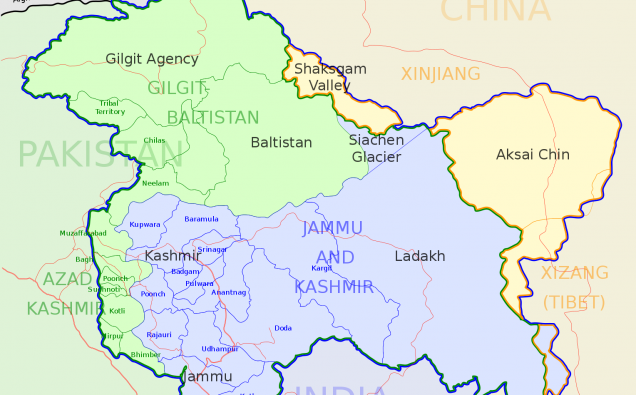
Kashmir regional map, Image by w:user:Planemad via Wikimedia Commons
New Delhi has rejected a United States’ role towards resolving Pakistani-India tensions that afflict the entire region from the possibility of expansion in South Asian trade and human development to Afghanistan’s search for stability.
America’s UN Ambassador Nikki Haley, while expressing the Trump Administration’s concern over the state of affairs between India and Pakistan, had said Monday that Washington would try to find a place for itself in the effort to nudge the two South Asian countries into peace talks.
She also indicated a role for President Donald Trump in the effort.
Ambassador Haley, who is of Indian ancestry, was asked whether the U.S. would make any effort to get India and Pakistan to engage in peace talks.
“I would expect that the (Trump) administration is going to be in talks and try and find its place to be a part of that (process),” she told reporters.
“We don’t think we should wait till something happens. We very much think that w should be proactive in the way that we are seeing tensions rise and conflicts start to bubble up, and so we want to see if we can be a part of that,” the U.S. envoy added.
But an Indian External Affairs Ministry statement said New Delhi sticks to its policy of addressing India-Pakistan dialogue – which it has refused to hold as ultra-nationalist Prime Minister Narendra Modi seems to have abandoned the course of talks at the altar of domestic political expediency.
“The government position for bilateral redressal of all India- Pakistan issues in an atmosphere free of terror and violence has not changed,” New Delhi’s statement said.
In Islamabad, the Foreign Ministry said Indian refusal to accept the US mediation offer clearly shows that New Delhi has a “weak position” on the Kashmir dispute.
Meanwhile, leaders of Jammu and Kashmir including APHC have welcomed the US offer of mediation on the decades-old dispute that remains on the UN agenda almost since inception of India and Pakistan as independent states in 1947.
The Indian refusal to the latest US overture to stave off the possibility of a full-scale conflict between its two South Asian allies is the latest setback to peace prospects in the region, and with it perhaps to hopes for stability in Afghanistan, where both countries are vying for influence.
The freeze in India-Pakistan peace process times with both nations’ economic advances, something which has the potential to reduce poverty for hundreds of millions of people who form the largest group of the poor in the world. India’s high growth rate and Pakistan’s fast-expanding economic prospects through China Pakistan Economic Corridor are major stories in the region. But so is the story of the plight of millions of people left out in the cold without access to even basic facilities of life.
But there is hardly any progress towards revival of India-Pakistan talks. Even the water talks between Indian and Pakistani officials held last month in Islamabad have not produced optimism.
In the backdrop of the hopeful economic scenario, experts are wondering why India is rebuffing the US goodwill efforts.
The reasons, analysts say, could be domestic Indian politics which thrives on anti-Pakistan platforms, India’s abortive attempt to isolate Pakistan diplomatically, to discredit the Kashmirrs’ struggle for their UN-pledged rights, India’s fears about the US-India-Pakistan triangle that might reverse de-hyphenation of U.S. policy towards South Asia to its campaign to constantly link Pakistan to terrorism.
But a lot of experts say by rejecting third country or UN mediation, India wants to conceal its treatment of Kashmiris, where stone-throwing young protesters have been subjected to what an article in The New York Times called the largest mass blinding campaign through spraying of pellets.
As for the US role, an Indian expert, quoted by the Voice of America, summed it up quite succinctly.
“India’s nightmare scenario with regard to the U.S. is that the U.S. will become active and try to resolve the Kashmir issue,” said Manoj Joshi at the Observer Research Foundation in New Delhi.
So, will the old-fashioned stalemate – that has followed repeated starts of dialogue between Islamabad and New Delhi – persist in the new climate?
The new climate revolves around four major areas – tremendous economic promise of South Asia, the rise of China, Russia’s newfound interest in the region and the United States’ stakes in Afghan stability and maintaining close ties with both Pakistan and India, which is also seen as a counterweight to China’s expanding influence.
















